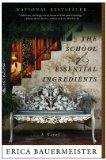Summary | Excerpt | Reading Guide | Reviews | Beyond the Book | Readalikes | Genres & Themes | Author Bio

The passing of the culinary torch marked the beginning of
years of experimentation, made both slower and more unusual
by Lillian’s blanket refusal to engage with the printed word,
even a cookbook. Learning the ins and outs of scrambled eggs,
following such a pedagogical approach, could take a week —
one night, plain eggs, stirred gently with a fork; the next, eggs
whisked with milk; then water; then cream. If Lillian’s mother
objected, she made no note of it as she accompanied Lillian on
her quests for ingredients, walking down the aisles reading
aloud from the book of the day. Besides, Lillian thought to herself,
scrambled eggs five nights in a row seemed a fair exchange
for a week otherwise dominated by James Joyce. Maybe she
should add chives tonight. Yes I said yes I will yes.
As Lillian’s skills progressed over the years, she learned
other, unexpected culinary lessons. She observed how dough
that was pounded made bread that was hard and moods that
were equally so. She saw that cookies that were soft and warm
satisfied a different human need than those that were crisp and
cooled. The more she cooked, the more she began to view spices
as carriers of the emotions and memories of the places they were
originally from and all those they had traveled through over the
years. She discovered that people seemed to react to spices much
as they did to other people, relaxing instinctively into some,
shivering into a kind of emotional rigor mortis when encountering
others. By the time she was twelve, Lillian had begun to
believe that a true cook, one who could read people and spices,
could anticipate reactions before the first taste, and thus affect
the way a meal or an evening would go. It was this realization
that led Lillian to her Great Idea.
“I am going to cook her out,” Lillian told Elizabeth as they sat
on her friend’s front stoop.
“What?” Eight months older than Lillian, Elizabeth had
long ago lost interest in cooking for a more consuming passion
for the next-door neighbor, who, even as they spoke, rode and
then launched his skateboard dramatically from a ramp set up
in front of Elizabeth’s gate.
“My mom. I’m going to cook her out.”
“Lily.” Elizabeth’s face was a mix of scorn and sympathy.
“When are you going to give up?”
“She’s not as far gone as you think,” said Lillian. She
started to explain what she had been thinking about cookies
and spices — until she realized that Elizabeth was unlikely to
believe in the power of cooking and even less likely to see its
potential to influence Lillian’s mother.
But Lillian believed in food the way some people do religion,
and thus she did what many do when faced with a critical
moment in their lives. Standing that evening in the kitchen,
surrounded by the pots and pans she had collected over the
years, she offered up a deal.
“Let me bring her out,” Lillian bargained, “and I’ll cook for
the rest of my life. If I can’t, I’ll give up cooking forever.” Then
she put her hand on the bottom of the fourteen-inch skillet and
swore. And it was only because she was still at the tail end of
twelve and largely unversed in traditional religions, that she
didn’t realize that most deals offered to a higher power involved
sacrifice for a desired result, and thus that her risk was greater
than most, as it meant winning, or losing, all.
As with many such endeavors, the beginning was a disaster.
Lillian, energized by hope, charged at her mother with foods
designed to knock the books right out of her hands — dishes
reeking with spices that barreled straight for the stomach and
emotions. For a week the kitchen was redolent with hot red peppers
and cilantro. Lillian’s mother ate her meals as she always
did — and then retreated into a steady diet of nineteenth-century
British novels, in which food rarely held a dramatic role.
From the prologue to The School of Essential Ingredients by Erica Bauermeister. Copyright Erica Bauermeister 2009. All rights reserved. No part of this book maybe reproduced without written permission from the publisher.
Your guide toexceptional books
BookBrowse seeks out and recommends the best in contemporary fiction and nonfiction—books that not only engage and entertain but also deepen our understanding of ourselves and the world around us.